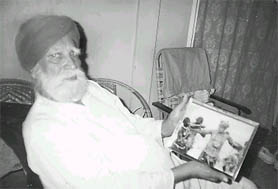Bakhtawar Singh
 It is, perhaps, not known to mainlanders that endangered aborigine tribes of the Andaman and Nicobar islands have age-old enmity with the sea.
It is, perhaps, not known to mainlanders that endangered aborigine tribes of the Andaman and Nicobar islands have age-old enmity with the sea.
There is evidence to say so. They have long list of festivals. But none of them is dedicated to the spirits of the sea. They have always considered the sea as devil and hate it. In fact, most of these tribals even use very little sea food to survive .They collect their food from forests which is their home and most eat wild pigs, honey, bananas and other eatables available in the forest area. They never worship the sea.
It is a part of the folklore of the Andamanese and the Nicobarese that centuries ago sea sucked up several islands and islets and wiped out a large population of aborigines. What happened last Sunday in these islands must have happened earlier also. Owing to this reason, they have no cultural tradition to praise the ocean.
There is another irony. December is observed as a month of the dead since ages ago it killed hundreds of people in the Car Nicobar area. In December, Nicobarese remember their dead and organise feasts to perpetuate their memory. And in this month of remembrance, Sea on Black Sunday exhibited its cruelty to the maximum by adding many more to the list of dear departed ones.
Interestingly, some of these tribes, especially Jarawas, whose population is just around 270, have a strong Sikh connection. Mr Bakhtawar Singh, who joined the Andaman and Nicobar police in 1935, played a great role in bringing Jarawas closer to the mainlanders. He started efforts in 1962, when he was allocated to the bush police and succeeded to win over Jarawas, who used to be very hostile towards inlanders, in 1974.
Talking to The Tribune on the phone from Port Blair, 89-year-old Mr Bakhtawar Singh, who originally belongs to Raipur Majri village, near Khanna, said: “I do not believe the reports that sea waves have wiped out the endangered aborigines such as Jarawas, Onges, Great Andamanese, Sentinelese and Shompens, whose total population is below 800. They have a great instinct of survival”.
Jawaras, Onges, Great Andamanese and Sentinelese live in Middle and South Andamans, about 65 km from Port Blair. Shompens, who never establish any contact with inlanders and are known for their hostility towards modern man, live in the Great Nicobar islands. Mr Bakhtawar Singh, who recently suffered a heart attack and got discharged from hospital on December 25, says that he had been in touch with Jarawas since 2000. “ But because of old age, I had stopped visiting them a few years ago”, he adds. “ But many of them are my friends and love me”, he adds.
It is a long story how Mr Bakhtawar Singh, whose one son Sarabjit Singh is an Assistant Engineer in Agriculture Department at Port Blair, won over Jarawas, who kill their targets with poison-coated arrows. “ I took the risk and many a time survived their attacks. I used to take fruits for them. Steadily, they started having faith in me and became my friends.”, he adds. “ I learnt their language to converse with them”, he adds.
Otherwise also, Sikhs have a historical link with the Andamans and Nicobar. About 4000 Sikhs live in these islands. Many of them settled there after release from Cellular Jail at the time of Independence. The Cellular Jail was set up by the British to lodge the revolutionaries and others who were fighting against them to free India from their clutches.
Interestingly, like aborigines, Sikhs have also strong contempt for the sea around the Andamans and Nicobar. They call that sea waters as “Kale Pani” (black waters).
A large number of Sikh ex-servicemen are settled near Campbell Bay, which has been reduced to rubble by the killer waves.
